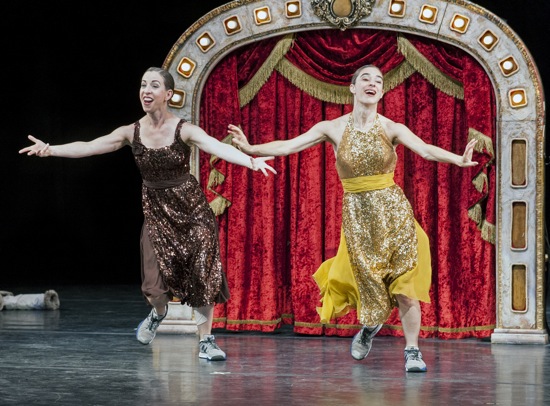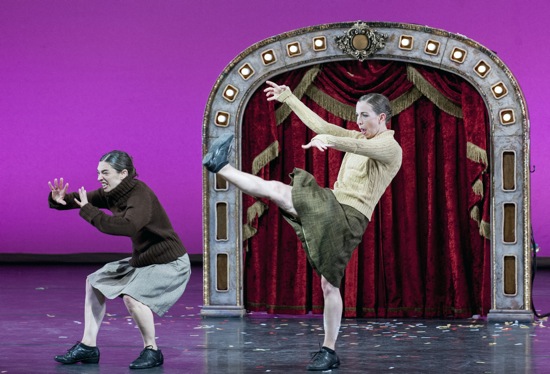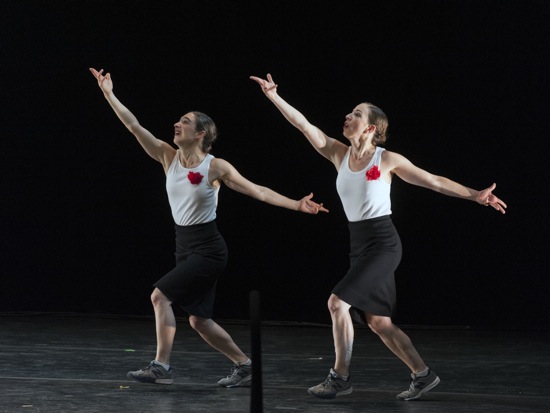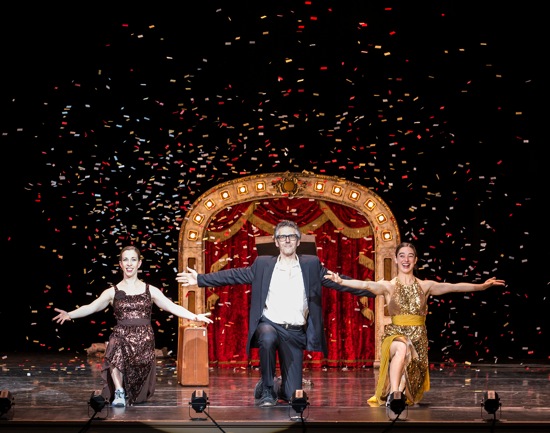Ira Glass of “This American Life” collaborates with Monica Bill Barnes & Company.
It’s an unlikely combination: Three Acts, Two Dancers, One Radio Host. Yet Ira Glass, the creator and voice of public radio’s Radio’s This American Life and Monica Bill Barnes and Anna Bass of Monica Bill Barnes & Company have been performing this show on and off since 2013.
The three turn out to have things in common. Actually, at the two sold-out pre-season performances at Jacob’s Pillow, Glass discovered a deeper connection to dance. In a 1941 film clip that can be seen in the Pillow’s newly expanded archive room, a woman exercising on a grassy expanse, exhibiting all the ardent grit and strength of modern dancers of her day, turns out to have been his aunt, Hortense Lieberthal.
This coincidence illustrates one of the motifs that pop up in this beguiling show: the timeless past delivered via media. As Glass mentions—“with respect”)—you can still listen to the jovial brothers of public radio’s Car Talk, even though one of them, alas, is no longer alive.
The format of the show (directed by Barnes) is what you might expect—yet not quite. The bespectacled and mic-equipped Glass—with his lectern, script, and iPad— makes engaging, easy-going commentary on selected interviews from This American Life, while punching a button on the iPad to let us hear the voices of the interviewees. Barnes and Bass perform astutely chosen excerpts from dances in their repertory, changing costumes behind the curtain of an extremely small, portable proscenium arch (set and costumes by Kelly Hanson). With its light-bulb frame and tassled red curtain, the arch gives off the tacky gaudiness of an old-time variety theater; you’ve gotta pop out of it smiling and ready to please.
Yet when the two disciplines are brought together, they reveal what Glass, Barnes, and Bass have in common. For one thing, awkwardness is a factor in both their art particular art forms. Glass, speaking occasionally about his own career, life, and relatives, is not always the intrepid, seemingly at-ease interviewer, and he ventures into situations that are not always smooth sailing. When raising issues of his own, he occasionally pauses, searches for words, stumbles over others. Barnes has perfected the image of the do-or-die performer in dance and, by extension, life; her pieces often contrast valiant, dogged attempts to put on a show with the actual expertise and gritty preparations involved. When she and Bass dance while balancing chairs overhead by gripping the chair backs in their teeth (this from her 2010 Mostly Fanfare), I think of an old film clip of the vaudeville performer, Princess Rajah. That was her skill. Her only skill. And she nailed it.
One of Barnes’s most endearing and hilarious dances (this one from her 2009 Another Parade) contrasts with James Brown’s fierce renderings of “Get Up (I Feel Like a Sex Machine”) with a side-by-side duet by Barnes and Bass. Wearing pleated, knee-length skirts and long-sleeved sweaters, they endeavor to convince us—and themselves—that they’re sexy as hell. And they get alternately aggressive and abashed about doing so. The audience that they imagine sitting in the Ted Shawn Theater instead of us is apparently not impressed, which only makes them try harder. Barnes pulls at the neckline of her sweater so she can bare one shoulder and lick it. How can you not love—and ache for—such ludicrous bravery?
The existing texts and dances, edited and meshed, open up new perspectives. For instance, while Glass lets us hear former United States poet laureate Donald Hall read “Last Days”—a poem he wrote during the time when his wife, poet Jane Kenyon, was dying of leukemia— Barnes and Bass perform an excerpt from a 2007 dance, Suddenly Summer Somewhere. They’re wearing drab overcoats and stand, embraced, on a small table set with plastic dinnerware. As the words leak around them, they try to move minimally and keep each other standing. Bass slumps, and Barnes lifts her until her feet are off the ground; now and then a tumbler falls off the table. Barnes comes close to the edge, looking down and reaching one foot toward the chair seat below. Bass tries to hold her back. For now.

Anna Bass (L) and Monica Bill Barnes giving their all in Three Acts, Two Dancers, One Radio Host. Photo: Nancy Palmieri
Watching the show, I’m not always entirely sure whether I’m laughing or crying. We see/hear the preparation and process that go with it: Glass opening a suitcase to unpack his equipment, Barnes and Bass dusting off the little proscenium arch and spraying what could be room deodorizer. Glass holding an overhead lamp that emits second-long flashes of Bass in Mostly Fanfare (2010), when cartons fell from nowhere into her arms. When you gaze at the two women vehemently selling their youth and charm in dresses glittering with spangles, you can’t help wondering whether they forgot to take off their gray sneakers and don high heels, or whether their feet are so sore they don’t give a damn anymore.
Repetition looms large in Act 1. What it meant to Glass in his early days in radio, when, he says, a show could feel like gum that had been chewed too long. What it meant to the nearly burned-out cast members of Riverdance, who allowed themselves to believe that if they bought hundreds of tickets for a particular raffle, they were sure to win (they were stunned when they didn’t). The woman in the cast whom Glass interviewed told him that the next night, with dreams of retirement and country cottages up in smoke, the disappointed performers put on the show as usual and were as big a hit as they’d been when they’d thought they were about to win big (Is this when “Let It Be Me” was being played? Maybe).
And all the time that Glass is recounting this tale, Barnes and Bass, each clad in a short black skirt and a white blouse with a red flower pinned to it, perform a vigorous dance that demands as much focused energy as a game of championship tennis. Entering, exiting, re-entering, starting over, they perform the routine, by my count, five times. They’re not exactly daisy-fresh by the last repetition, but neither are they saving themselves one jot.
Act 2 is about love, and Act 3 is about its loss (vaudeville style, a placard announcing each new act is carried across the stage). This means that if you put the sad stories and the happy ones in a balance, it’s not certain which would weigh the most. Glass interviews middle-school kids approaching their first prom, stoic about their fears (and, in the case of one sixth-grade boy, resignation; his mother made him wear two shirts, one atop the other). For this sequence, a stagehand is instructed to stand on a chair and rotate, holding a mirror ball high, while Barnes and Bass bring six audience members onto the stage and get them to pair up and dance. At the end, they’re handed crowns and ribbons, as if they’ve all won something. Which they sort of have.
And how enigmatic is the increasingly absurd tale in which a nervous young ad man charged with making a sample presentation that would show his ability to create brand loyalty is encouraged by his wife to try it out with her. After a while, hearing him repeatedly identifying himself as a product and his wife as a potential consumer, you’re laughing incredulously, even as you feel for the guy, admire his supportive wife, and thinking dark thoughts about consumerism. Glass’s subtle, almost affectionate commentary opens up these possibilities.
Over the course of the evening, we hear the recorded voices of the dancers talking a bit with Glass about what they do. We learn about losing people you love—parents, lovers, friends. And there’s always the show—the show with the looped-up curtains, the top hats and jokes and smiles, with balloons and bubbles and a touch of confetti—all fermented in backstage grit and hours of practice. Lighting designer Jane Cox heightens the magic by turning the cyclorama pink or lavender or deep blue and aiming spotlights and mostly rosy beams. We need, Glass tells us and his colleagues, to “end on a high note.” And they do. Batons twirl. The lights go helpfully crazy. Three acts, two dancers, and a radio host. Check. And much, much more.





wish I’d seen this, Deborah. It sounds so original.